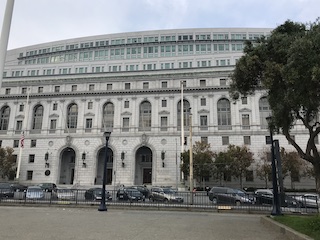It is well established that someone cannot challenge the introduction of evidence obtained in an allegedly unlawful search unless the individual had a reasonable expectation of privacy in the object seized or the place searched. Rakas v. Illinois (1978) 439 U.S. 128, 143, 148. That fundamental aspect of suppressing evidence often discourages many defendants from looking deeper into the facts of the case and instead shifting their defense to plea bargaining.
This can be a big mistake, as the following case summary with a sharp defense attorney demonstrates. In fact, counsel for Defendant Lamonte Brewer here, David Glenn Brown, did a great job and never gave up. The following summary of a recent First Appellate District opinion shows why.
Brief Synopsis: If one is detained without probable cause, he or she may challenge a police search that takes place thereafter even if that person lacks a reasonable expectation of privacy in the area searched, as the following case summary exemplifies.
On September 1, 2016, about 9:40 p.m. at night, Detective Cliff Calderan of the Contra Costa Police Department was on patrol near the Crescent Park apartment complex in Richmond. The Manor Boyz, a criminal street gang, claimed the complex as part of their territory. The police considered this area to be a high-crime area of Richmond.
As Calderan was driving through the parking lot, he looked at a parked red Dodge Caravan and saw two people in the front seats. He also saw someone sitting in the middle of the bench seat behind the driver. This was defendant Lamonte Brewer. When Calderan’s lights shined into the front of the Caravan, Calderan saw Brewer in the rear passenger seat duck down behind the driver’s seat as if to hide.
Calderan became suspicious of what was going on, so he stopped to speak to the occupants of the car. Calderan first called for backup and a few other officers showed up. The officers approached the minivan and told all three occupants to get out. The three occupants got out with their hands up. Officers had their guns drawn.
 First Appellate District Court San Francisco
First Appellate District Court San Francisco
The front seat passenger was searched and Brewer had some marijuana on him, which was legal after November 1, 2014 when Prop 47 was passed. The officers then conducted a search of the vehicle and found a Glock 10-millimeter loaded with a 15-round magazine underneath the rear of the driver’s seat, right in front of where Brewer had been sitting.
Brewer was then arrested and charged with three gun-related charges in Contra Costa Superior Court. At the preliminary hearing, his lawyer moved to suppress the evidence of the gun as the fruit of an unlawful detention, but the trial court judge denied the motion, reasoning that Brewer lacked a reasonable expectation of privacy in the minivan because it was not his minivan.
Brewer renewed this motion as part of a Penal Code § 995 motion in the trial court after the preliminary hearing and the trial court judge denied the motion again, repeating the reasoning that Brewer did not have a reasonable expectation of privacy in the area searched. The trial court judge, however, held that it was clear that the police detained Brewer without probable cause.
Brewer then filed a petition for a writ of mandate with the First Appellate District in San Francisco, which agreed with Brewer that the reasonable expectation of privacy issue was not the threshold issue at all. Instead, what was legally relevant was whether police made an unlawful detention.
The First Appellate District, in Lamonte Brewer v. Superior Court of Contra Costa County (2017 DJDAR 10576), then cited many reported decisions from other jurisdictions that held that a defendant, i.e. a passenger in a car that is not his or her own, may move to suppress evidence found in the car as the fruit of an unlawful detention even if defendant lacked a reasonable expectation of privacy in the vehicle where the evidence was found. See U.S. v. Ellis (6th Cir. 2007) 497 F.3d 606, 612; U.S. v. Kimball (1st Cir. 1994) 25 F.3d 1, 5-6; U.S. v. McNeely (10th Cir. 1993) 6 F.3d 1447, 1450; and U.S. v. Martinez (D. Kan. 2008) 537 F. Supp. 2d 1153, 1156-1157.
Moreover, the U.S. Supreme Court decision in Brendlin v. California (2007) 551 U.S. 249 supported Brewer’s main argument. Brendlin held that a passenger of a vehicle stopped in a traffic stop is detained by police. Therefore, the passenger is “seized” within the meaning of the Fourth Amendment and so the passenger may challenge the constitutionality of the stop.
Here, since Brewer was detained without probable cause, he could challenge the search that followed, regardless of whether he had a reasonable expectation of privacy in the interior of the car.
We especially like this ruling and feel it is under-appreciated and not applied often enough, but it should, as we think it is quite common for police to make unlawful detentions after improper traffic stops (often after an illegally prolonged detention), especially in DUI and in cases involving illegal possession of a controlled substance.
The citation for the First Appellate District Court ruling discussed above is Lamonte Brewer v. Superior Court of Contra Costa County (1st App. Dist., 2017) 16 Cal.App.5th 1019.
Contact us.  First Appellate District Court San Francisco
First Appellate District Court San Francisco